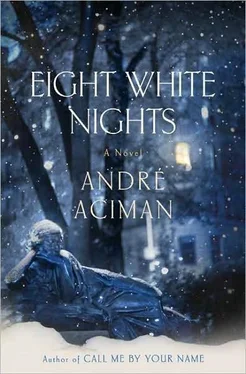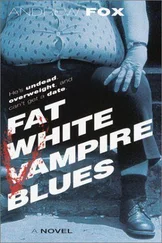I looked up and knew. It was all there: fear, wanting, sorrow, shame, bitterness, ache, and exhaustion.
Now, as I spied the very end of her block from Broadway with its one lit window that must have been the maid’s room overlooking Straus Park, it struck me that though we’d never really had anything here, still maybe we’d also lost everything here, as though something from being so piously wished for had managed to become the memory of something lost without having existed at all, a wish with a past that never had a present. We’d been lovers here. Once. When? Couldn’t tell. Perhaps always and never.
•
I walked down 105th Street once again — placid, serene, white-pillared lane. The town houses stared at me with frowning suspicion.
Why are you here again?
I am here because I don’t know why I’m here.
Her lights were still on. But too bright. What on earth could she have been doing? Should I look for a human, two human shadows flitting behind the drapes? Would she come near the window when her cell phone rings? Just tell me I’m not spying at the wrong window.
Could she be the type who sleeps with all the lights on? What if she left the lights on because she likes to come back home and find the whole place lit up, the way I do sometimes, to forget I live alone? Or was she moving from room to room, which was why the place was all aglow? Or were the lights on everywhere because she hated the dark when she was alone and this was her way of showing she was alone and hated it?
Suddenly someone turned off the lights in her apartment. She’s gone to bed. A frightful thought raced through my mind: They’ve gone to bed.
But on 106th Street, I noticed that her kitchen light was still on. Who goes to bed with a lover and leaves the kitchen light on?
No one.
Unless it’s in the heat of passion.
What was she up to?
Cognac? Hot toddy? A little snack? How easy can human contact be, how easy had it always been? Why was it so unusually difficult with Clara?
The kitchen light still puzzled me.
What can a kitchen light possibly mean? How many times do I turn mine on and off before going to bed?
And then it hit me: I’ll never ever know why that light was on so late, nor ever see that kitchen from the inside again. Suddenly the kitchen light stood like a distant beacon that was far crueler than the storm itself.
Boris!
He stepped out into the cold to finish his cigarette, stood there awhile gazing at nothing, then flicked the butt halfway across the street. I made certain he didn’t see me.
The moment he stepped back into the lobby, I crossed the street and found myself headed toward 107th Street.
I could not stay on the sidewalk too long. She might look out of her kitchen and catch my eyes glued to her windows. For all I knew, she might have been looking out of her window and staring straight at me. Or perhaps the two of them were. So I walked by in a rush. But having reached the end of her block too soon, I realized that there was nowhere to go, and rather than go the long way around to Broadway and back, I started walking back on Riverside, slowly, then once back to 105th, went up again to 107th, back and forth, again and again, always affecting a busy air, not realizing that there wasn’t a reason in the world why anyone should walk by eight times on Riverside Drive and look so busy at such an ungodly hour of the night.
My passacaglia, I’d tell her one day, not Leo’s prelude, not your sarabande or your Folías, not Beethoven’s Adagio. Just my passacaglia, my passing along here, and losing my mind.
Perhaps I should call, I thought. Not to talk. But to remind her I wasn’t out of her life quite yet. I’d let it ring once, then hang up. But I knew myself: having called her and found it wasn’t so difficult, I’d be tempted to repeat the call. It was the sort of thing Inky might do. Take forever to call the first time, call a second time twenty minutes later, then every five minutes, then all the time. If she wanted to speak to me, if she was alone, she’d call back. If she didn’t call back, well, either she’d turned off the phone or she wasn’t going to play this game. In the end, she’d ask him to pick up the phone and tell whoever had called that she was in Chicago. Say I’m in Chicago.
Had I encouraged them to sleep together?
Suddenly the lights in the living room are on again.
She is unable to sleep. She is fuming. She is upset.
I should call, shouldn’t I?
What if she knows I am downstairs? She is the sort who would intuit just that. She knows I am downstairs this very moment.
Or worse yet, what if she simply wants me to spin these thoughts in my head, including the worst one of all: that she isn’t even thinking of me?
Then the lights go out.
Only a pale, bluish light near her window. Was it a night-light? Was Clara really the type to use night-lights? Or was it a dusky, weakened incandescent light from another room, or light reflected from a nearby street sign? A candle? God forbid, no, not a candle, not a lava lamp. Clara Brunschvicg would never own a lava lamp!
Ah, to make love to Clara Brunschvicg by the light of a lava lamp.
Noir, noir thoughts.
•
I did not call that night. The next morning I was awakened by a light pattering on my windowpane, the sound of rainfall, timid and tentative, without the hysteria or conviction of a downpour, like rain on an August afternoon that might stop any moment and restore things to how they’d been minutes earlier. It felt like afternoon. I wouldn’t have minded if I’d woken up six months later. Let time, not me, deal with this.
I’d had a fitful night, perhaps with weird dreams flaring through a wasteland called sleep, though I couldn’t remember a single dream, save for their collective pall, which lingered in my sleep like smoking stacks on a parched landscape after a great fire. At some point toward dawn I felt the same rapid throbbing in my chest that had made me go to the hospital the day before. But I must have fallen back to sleep. If I have to die, let it be in my sleep.
By morning, I knew exactly what it was. It didn’t surprise me; what surprised me was its ferocity, its single-minded persistence in every part of my body. No ambiguity, no doubt, no cloud could be summoned to give it a kinder name. This was not a whim. It was a commandment that must have started somewhere in mid-sleep, slogged its way out of one nightmare into the next, and finally worked itself out into this morning’s light. I wanted her and I wanted nothing else in the world. I wanted her without her clothes, with her thighs wrapped around me, her gaze in mine, her smile, my every inch inside her. “Perse me, perse me, Printz, perse me one more time, and another, and another still,” she’d said in my sleep in a language that seemed English but might just as easily have been Farsi or French or Russian. This is all I wanted, and not having it was like watching life drained from my body and, in its place, a false serum injected straight into my neck. It wasn’t going to kill me, and I wasn’t going to die, and things would go on as before, and I’d definitely recover, but not having her was like laughing and drinking while watching every single person I grew up with being taken to the gallows and hanged, until my turn came, and I’d still be laughing.
My own body was pounding at my door, pushing the door open with the dogged truculence of a crime about to be committed in which I was both felon and victim — open up, open up, or I’ll ram the door down— Perse me, perse me, Printz, perse me one more time, she’d said, to which I finally replied, I’ll perse you with everything I have, just make me make trouble, make me do something, make me hurt you, as I want you to hurt me, Clara, and hurt me hard, because this staying put like two boats tied to a dock is like waiting decades on death row, make me yield to you as I know I must and have been craving to ever since I kissed you and you snubbed me with a No that I want you to take back with the very lips I kissed that night, take back the curse and spit it from your mouth and I will take what you cast out because it was mine before it was yours.
Читать дальше












